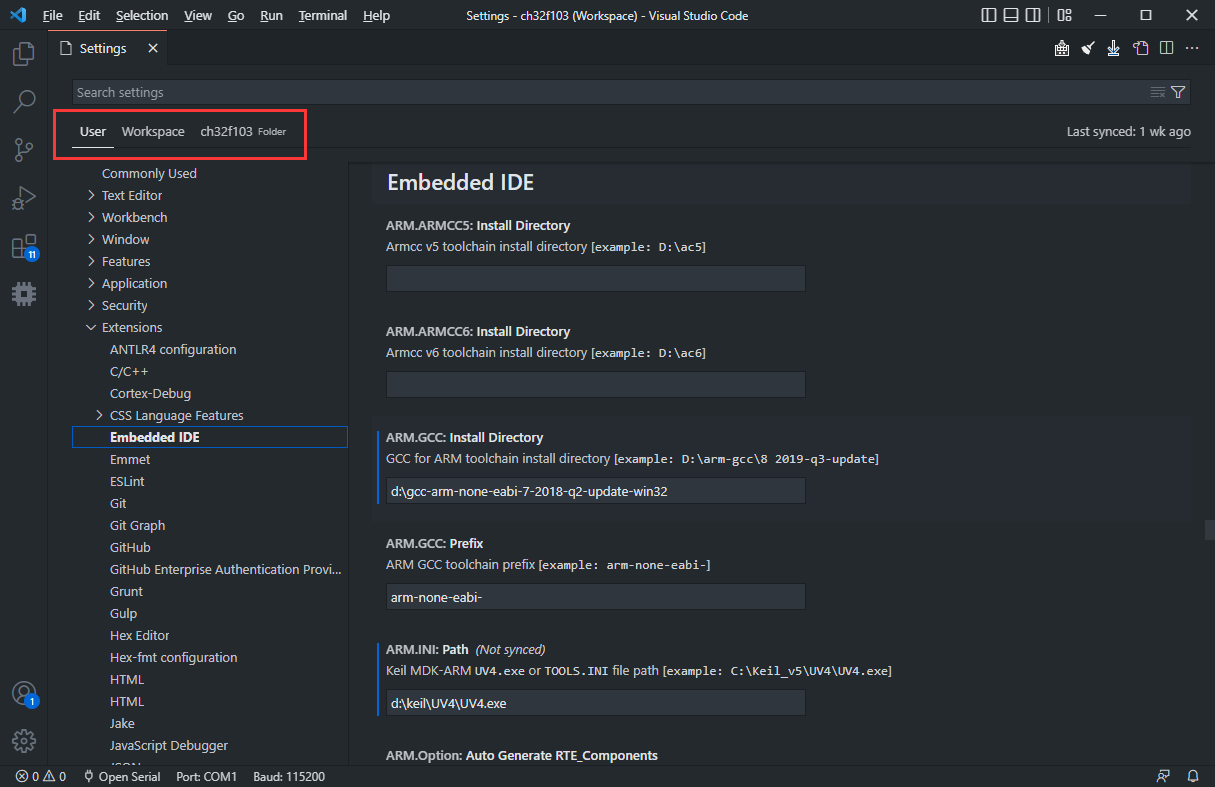Plug-in Settings
How to modify plug-in settings
Modify Extension Settings
EIDE is a standard VSCode extension, you can modify plug-in settings in vscode settings page.
If you have opened a eide project, there are 3 scope for setting items,
they are: User, Workspace, Folder

In User Scope:
Any changes are specific to the current user
If you want to set a global setting for eide, you should switch to
Userscope !In Workspace Scope:
Any changes are specific to current vscode workspace (every eide project is a vscode workspace)
So if you want to modify settings for current eide project, you should switch to
Workspacescope or modifyxxx.code-workspacefile directly !In Folder Scope:
Any changes are specific to current root folder
for a vscode workspace, this scope will not take effect
The Scope Priority:
Workspace > Folder > User
Tips
There are some tips for eide plug-in settings.
Setup GCC Compiler Prefix
You can set the compiler prefix for gcc compiler.
Here are available settings for gcc prefix:
| settings name | description |
|---|---|
EIDE.ARM.GCC.Prefix | ARM GCC toolchain prefix, example: arm-none-eabi- |
EIDE.RISCV.ToolPrefix | RISC-V toolchain prefix, like: riscv-none-embed- |
EIDE.Toolchain.AnyGcc.ToolPrefix | Any gcc famliy toolchain prefix |
1) If you want to apply settings to Global Region, goto
VSCode Settingsand modify it.2) If you want modify compiler prefix for current project, open
xxx.code-workspacefile in your workspace root folder, and modify settings like this:{
"settings": {
// .... other settings ....
"EIDE.ARM.GCC.Prefix": "arm-none-eabi-"
//"EIDE.RISCV.ToolPrefix": "riscv-none-embed-"
//"EIDE.Toolchain.AnyGcc.ToolPrefix": "xxx"
// .... other settings ....
}
}
You need relaunch vscode if you have modified these settings.
Specify The Compiler Separately For Project
Example for arm gcc project
If you have install some gcc compilers with different versions, like: arm-none-eabi-gcc v7.3, arm-none-eabi-gcc v9.3, arm-none-eabi-gcc v10.3
If the global default compiler is arm-none-eabi-gcc v9.3, but now:
You want to use arm-none-eabi-gcc
v7.3in projectprj_AYou want to use arm-none-eabi-gcc
v10.3in projectprj_B
You can do this as follows:
Open
.code-workspacefile in projectprj_A, and modify settings:EIDE.ARM.GCC.InstallDirectory{
"folders": [
{
"path": "."
}
],
"settings": {
// other settings ....
"EIDE.ARM.GCC.InstallDirectory": "/your/arm-none-eabi-gcc-v7.3/compiler/path"
// other settings ....
}
}Open
.code-workspacefile in projectprj_B, and modify settings:EIDE.ARM.GCC.InstallDirectory{
"folders": [
{
"path": "."
}
],
"settings": {
// other settings ....
"EIDE.ARM.GCC.InstallDirectory": "/your/arm-none-eabi-gcc-v10.3/compiler/path"
// other settings ....
}
}
Then:
Click
build, your projectprj_Awill be build with compiler:/your/arm-none-eabi-gcc-v7.3/compiler/path/bin/arm-none-eabi-gccClick
build, your projectprj_Bwill be build with compiler:/your/arm-none-eabi-gcc-v10.3/compiler/path/bin/arm-none-eabi-gcc
Besides, there are some variables can be used in settings items:
# vscode project workspace folder path
${workspaceFolder}
# user home path
${userRoot}
For example, if you want to specify some eide utility tools path, you can use it like this:
{
"folders": [
{
"path": "."
}
],
"settings": {
// other settings ....
"EIDE.ARM.GCC.InstallDirectory": "${userRoot}/.eide/tools/gcc_arm_v7_3_1"
// other settings ....
}
}